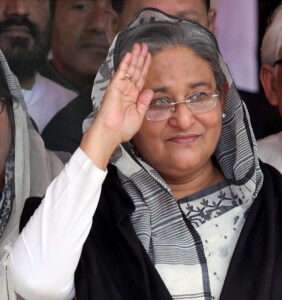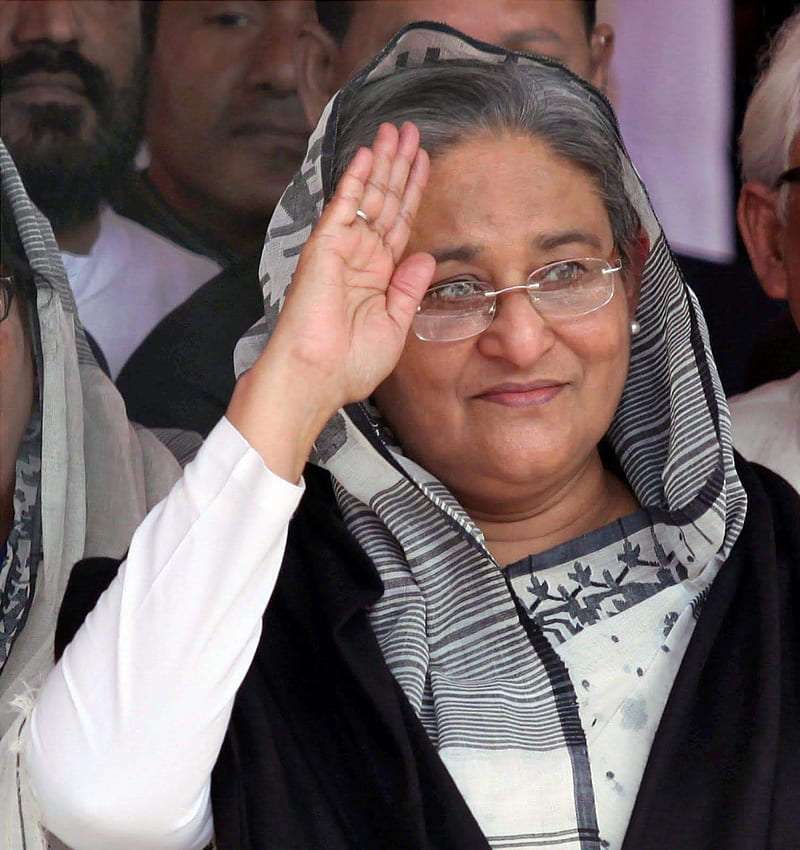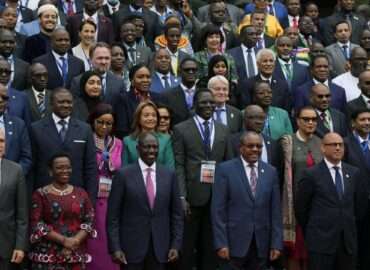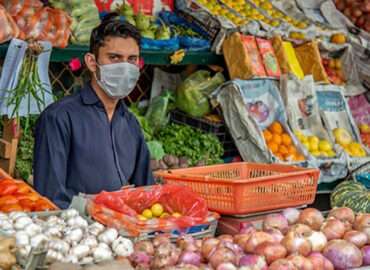
Image Courtesy – Peakpx.
Bangladesh Prime Minister Sheikh Hasina secured her anticipated fourth consecutive term, with her party clinching an absolute majority in the general election, as announced by the poll body on Monday. The election witnessed low turnout due to the main opposition’s boycott.
The Bangladesh Nationalist Party (BNP), the primary opposition, abstained from the polls after participating in the 2018 vote, following Hasina’s refusal to meet their demands for resignation and the establishment of a neutral authority to oversee the general election.
Daughter of Sheikh Mujibur Rahman, the founding father of Bangladesh who tragically perished in a 1975 army coup along with most family members, the 76-year-old Hasina first assumed the role of prime minister in 1996. This marks her fifth term in office.
During her impactful 15 years in power, Hasina has been lauded for revitalizing the economy and the extensive garment industry. Additionally, she has earned international acclaim for providing refuge to Rohingya Muslims escaping persecution in neighboring Myanmar.
Rather than any political party, independent candidates successfully obtained a combined total of 63 seats, the second-highest tally following Hasina’s Awami League (AL), which secured 222 seats, posing a challenge in forming a parliamentary opposition.
The existing opposition, the Jatiya Party, only managed to secure 11 out of the 300 parliamentary seats, as reported by the Election Commission.
Nearly all victorious independent candidates were individuals initially rejected by the AL but were later persuaded by the party leadership to run as “dummy candidates,” adding a facade of competitiveness to the election on the global stage.
What has Sheikh Hasina done for Bangladesh?
Sheikh Hasina, the Prime Minister of Bangladesh, has emerged as a transformative leader, significantly shaping the nation’s economic landscape during her tenure. This report provides an overview of her multifaceted contributions to the uplifting of the Bangladeshi economy.
Under Hasina’s adept leadership, Bangladesh has experienced consistent and robust economic growth, solidifying its position as one of the fastest-growing economies globally. This achievement underscores her strategic vision and effective policy implementation.
A pivotal aspect of Sheikh Hasina’s economic strategy has been the deliberate focus on developing the garment industry. Bangladesh, under her stewardship, has become a global powerhouse for textile and apparel manufacturing. This sector not only contributes significantly to the nation’s exports but also serves as a vital source of employment, empowering the workforce and fostering economic resilience.
Infrastructure development has been a cornerstone of Sheikh Hasina’s economic agenda. From the construction of roads and bridges to the establishment of power plants, her government’s commitment to enhancing the country’s infrastructure has not only improved internal connectivity but has also attracted foreign investments. This has positioned Bangladesh as an increasingly attractive destination for global businesses.
In tandem with economic growth, Sheikh Hasina has championed social welfare programs aimed at addressing poverty and raising living standards. The “Asrayan Project,” a testament to her commitment to social development, seeks to provide housing for the homeless, reflecting a holistic approach to national progress.
Recognizing the transformative power of technology, Sheikh Hasina introduced the “Digital Bangladesh” initiative. This visionary effort aims to modernize public services, improve connectivity, and foster technological innovation. The digitization drive underscores her forward-thinking approach in aligning Bangladesh with the demands of the contemporary global economy.
Foreign Direct Investment (FDI) has been actively encouraged under Hasina’s administration through the creation of a business-friendly environment. This has resulted in increased foreign investments, contributing to economic diversification and sustained growth.
Sheikh Hasina has also tackled the energy crisis head-on by focusing on increasing power generation capacity. The development of new power plants has not only alleviated energy shortages but has also supported industrial growth, further enhancing the nation’s economic sustainability.
In parallel, comprehensive poverty reduction strategies and social safety net programs have been instrumental in Sheikh Hasina’s efforts to improve the living conditions of the impoverished population. These initiatives have played a pivotal role in the decline of overall poverty rates.
In conclusion, Sheikh Hasina’s leadership has steered Bangladesh towards a remarkable economic transformation. Her visionary policies, spanning from industrial development and infrastructure projects to social welfare and technological innovation, have garnered both domestic and international acclaim. Bangladesh, under her guidance, stands as a testament to the possibilities of sustained economic growth and prosperity.
Why is the opposition boycotting the elections?
The political arena in Bangladesh is primarily characterized by the ongoing rivalry between two major political factions – the socialist-secular Awami League (AL) and the conservative-nationalist Bangladesh Nationalist Party (BNP). This rivalry extends beyond ideological disparities, delving into personal animosities and historical grievances between Prime Minister and AL chair Sheikh Hasina and BNP chair Khaleda Zia. These prominent figures, often referred to as the ‘Battling Begums,’ embody the deep-seated tensions within the political landscape.
The competition between the AL and BNP frequently escalates into violence, both within and outside of election cycles. Instances of aggressive attacks against political adversaries, street confrontations between the opposing parties, tumultuous anti-government protests, and the use of state repression during demonstrations are common occurrences. Notably, the student, youth, and labor wings affiliated with these parties often play active roles in perpetuating such episodes of violence.
The Bangladesh Nationalist Party (BNP) and some of its smaller allies have opted to abstain from participating in the elections, citing concerns about their credibility.
In response to this decision, the party has called for a two-day nationwide strike starting on Saturday. Additionally, they have urged Prime Minister Hasina’s resignation and proposed the establishment of a neutral authority to oversee future elections.
Addressing reporters after casting her vote on Sunday at City College in Dhaka, accompanied by her family, Hasina remarked, “The BNP is a terrorist organization. I am doing my utmost to ensure the continuity of democracy in this country.”
The opposition alleges that Hasina’s Awami League has strategically fielded “dummy” candidates as independent contenders to create the illusion of fairness in the elections. Meanwhile, the main opposition leader, Khaleda Zia, contends that she is effectively under house arrest, facing corruption charges that she asserts are baseless.
What’s next for Bangladesh?
Following the announcement of the results in the 12th general election, Awami League leader Hasina has directed her party leaders, workers, and supporters to refrain from organizing any victory processions. The 2024 Bangladesh elections experienced a notably low voter turnout on Sunday, marked by boycotts against the current government. Chief Election Commissioner Kazi Habibul Awal reported an overall turnout of 40 percent after the polls concluded.
While election day remained calm in Bangladesh with minimal disturbances reported, pre-election protests witnessed at least 18 instances of arson, resulting in four fatalities. Authorities attributed much of the violence to the Bangladesh Nationalist Party (BNP), accusing it of attempting to undermine the election.
Meenakshi Ganguly from Human Rights Watch expressed concerns, stating that the government failed to assure opposition supporters about the fairness of the polls, and there are apprehensions of a potential crackdown.
Envoys from China, Russia, and neighboring India were among the first to extend congratulations to Hasina. They visited her at home on Monday, commending her “absolute victory” in statements issued by her office.
Chinese Ambassador Yao Wen emphasized the “long-established friendship” with Dhaka, highlighting the strengthening ties during Hasina’s 15-year-long rule.
The political landscape in Bangladesh, home to 170 million people, has been historically shaped by the rivalry between Hasina, the daughter of the country’s founding leader, and two-time premier Khaleda Zia, the wife of a former military ruler.





